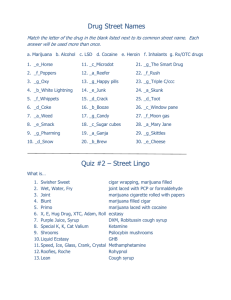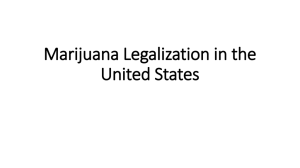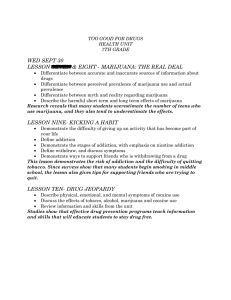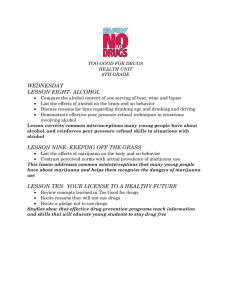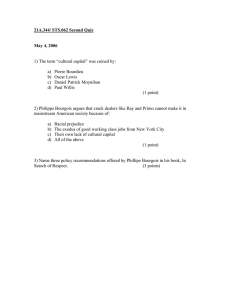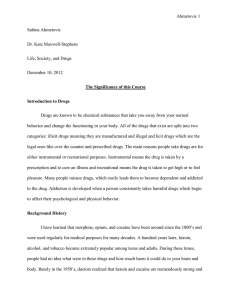War on Drugs Lecture China
advertisement
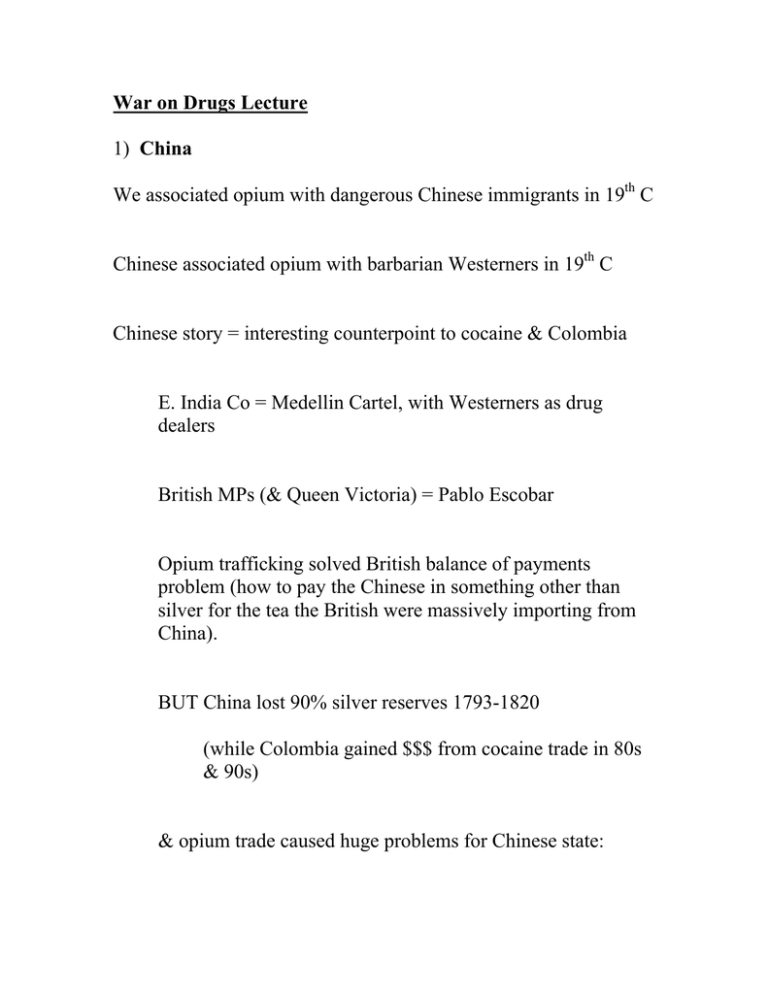
War on Drugs Lecture 1) China We associated opium with dangerous Chinese immigrants in 19th C Chinese associated opium with barbarian Westerners in 19th C Chinese story = interesting counterpoint to cocaine & Colombia E. India Co = Medellin Cartel, with Westerners as drug dealers British MPs (& Queen Victoria) = Pablo Escobar Opium trafficking solved British balance of payments problem (how to pay the Chinese in something other than silver for the tea the British were massively importing from China). BUT China lost 90% silver reserves 1793-1820 (while Colombia gained $$$ from cocaine trade in 80s & 90s) & opium trade caused huge problems for Chinese state: (1) addiction – 1% population, but 90% in coastal areas (2) corruption (3) Losing practical control of coastal ports they lost Hong Kong here (Hence death sentence for teaching Chinese to foreigners) Opium wars (1840 1st of series) drove home state’s weakness in defending its territory Again, we see how drug trade can compromise integrity of state, its territorial control & it excites draconian, repressive measures: executions in China & in US…. 2) David Musto (Yale) Assigned for historical perspective We tend to freeze current judgments about licit & illicit drugs His piece makes clear that opium, cocaine & marijuana have been treated more tolerantly in past That there’s rhythm to American drug laws That there are intermittent moral panics often tied to ethnic fears & fear about borders (cf. McCarthyism) That Prohibition of alcohol in 20s is not stand-alone story but part of wider story involving opium, cocaine, marijuana Interestingly, at that time sales of opium & cocaine allowed (albeit restricted), but not alcohol 3) Let’s look at regulatory history 19th C marijuana unknown, but cocaine & opium popular syringe = breakthrough of late 19th C You heard before about Freud & Conan-Doyle on cocaine Coleridge (Kubla Khan) used opium De Quincy (Confessions of an English Opium Eater) no regulation 1906 Pure Food & Drug Act – mandated labeling of cocaine & opiates 1912 Hague Opium Convention (signed by 12 countries) 1914 Harrison Act (mandated by Hague), limited narcotics to medicine Musto presents this as beginning of state control of recreational drugs. It was also beginning of state regulation of pharmaceutical industry. 1919 Supreme court rules doctors can’t maintain addiction of patients – that’s illicit, non-medical use of cocaine & opiates drawing line between medicine & recreation Doctors now prosecuted for prescribing to addicts 1920s opium & cocaine use largely die out (coincident with Prohibition) interesting to ask why 1920s Mexicans bring marijuana to US marijuana used by humans for at least 5,000 years also used in 19th C to treat insomnia, pain, coughs, headaches had been grown for hemp since 18th C – grown by George Washington! Mexicans introduced psychoactive use Spread to blacks & avant-garde musicians Reefer Madness movie as response William Randolph Hearst campaigned against marijuana Interest as timber owner in stamping out rival source of paper 1937 Marihuana Tax Act: had to have transfer tax to sell marijuana– never granted 1960s saw resurgence of marijuana & heroin (partly coming from SE Asia via veterans– connection of drugs & war = interesting topic) Faced with mass disobedience to law… 1970 Drug Abuse Prevention & Control Act separated marijuana from narcotics & reduced penalties 1972 Presidential Commission on Marihuana recommended legalization infuriated Nixon 11 states decriminalized marijuana in 70s 1980s tide turned back to punishment & proscription Reagan had first Drug Czar 1986 Drug Abuse Act: mandatory minimums established Some other countries kept moving to decriminalization Netherlands – soft v hard drugs (cf. 1970 legislation) UK under Blair decriminalized marijuana Switzerland: “harm reduction” British Columbia has decriminalized marijuana Canada set to follow suit, but new conservative prime minister derailing full decriminalization US approach based on war metaphor and state prosecution Marijuana as Schedule 1 drug You read in Schlosser about legal penalties – worse than murder or child molestation, Penalties vary by state (fair??), but trouble if Feds involved Also: asset forfeiture (without right of appeal) Lose driving license (even if not driving the car where marijuana found) Lose college aid Lose public housing access Drug tests in workplace & for after school activities Thermal imaging allowed by courts Courts generous with warrants Madatory minimums have transferred power from judges Æ DAs Highest penalties for those with least info (therefore least plea bargaining power) In meantime, growers more sophisticated 80s border controls Æ more domestic growing sophisticated breeding techniques to increase THC indoor hydroponics remote growing (with nutrients on timers) so not caught story of technology interesting Some pushback: Medical marijuana approved in several states in recent years (but Supreme Court overruled these initiatives, saying Federal government has sole control over safety determinations and medical use determinations for drugs) Some from right advocate legalization: Milton Friedman, George Shultz, Gary Johnson
